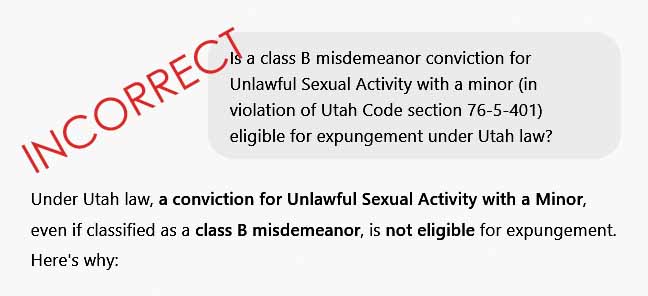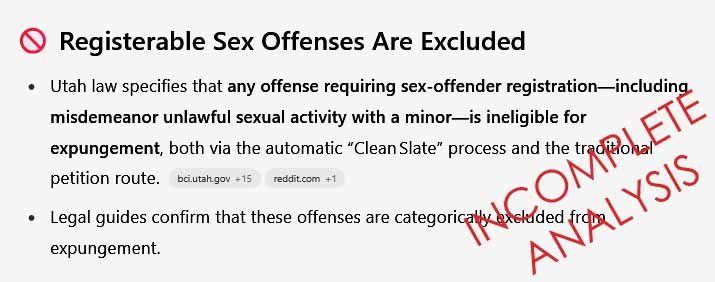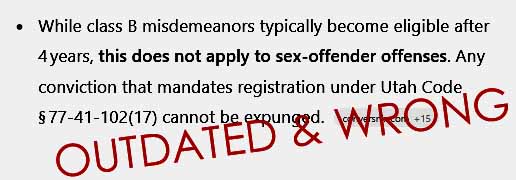How does a good attorney measure up against AI for legal advice on expungements in Utah?
Largely out of curiosity, we checked to see what AI might have to say about a question we were asked recently about expungement eligibility. Here’s the question.
“Is a class B misdemeanor conviction for Unlawful Sexual Activity with a minor (in violation of Utah Code section 76-5-401) eligible for expungement under Utah law.”
Here’s what AI had to say, and it was wrong.

A class B misdemeanor for unlawful sexual activity with a minor in fact IS ELIGIBLE for expungement.
The AI also gave its analysis. So let’s take a look at that.

The AI answer relies on some general rules, but does not look at some of the limited exceptions that are critical to getting a correct answer on this question.
Note that the AI answer appears to cite at least one web source that should generally be reliable – Utah’s BCI (Bureau of Criminal Identification). But the BCI website is not intended to be a source of legal advice. It can be great for general information. But real people need real advice from a competent attorney.
AI next tries to support its answer by citation to the Utah Code.

Title 77, Chapter 41, formerly contained Utah’s Expungement Act. But the current version (including some very significant changes) is found in Title 77 Chapter 40a. Specifically, section 77-4a-303 addresses eligibility for expungement of a criminal conviction. Subsection (2)(a)(v) does still that an offense that requires registration is not eligible for expungement. But AI misses on the question of whether this class B misdemeanor can be expunged.

The right conclusion requires going through the right analysis. A huge missing piece in the AI analysis is on the question of the registration requirement.
The AI response is generally correct in noting that registerable offenses are not eligible for expungement. But the AI fails to look at whether THIS class B misdemeanor requires registration.
Utah Code 53-29-202 establishes a long list of statutes that are subject to the registration requirements of Utah’s sex, kidnap, and child abuse registry system. Subsection (1)(a)(ix) includes unlawful sexual activity with a minor, but also provides exceptions under Utah Code 76-5-401(3)(b) or (c). Those exceptions are key to the present analysis.
Class B Misdemeanor – Unlawful Sexual Activity with a Minor
For purposes of section 401, the term “minor” is defined as meaning “an individual who is 14 years old or older, but younger than 16 years old.” The default level of conviction for a violation of this section is a felony. But subsections (3)(b) and (3)(c) establish circumstances under which the offense is only a misdemeanor. The conviction will be:
- a class B misdemeanor if the defendant is less than four years older than the minor (e.g., a 15 1/2-year-old minor and a 19-year-old defendant); or
- a class B misdemeanor if the defendant is 18 years old and still enrolled in high school at the time the offense is committed (e.g. a high school senior age 18 plus two months and a high school freshman age 14 plus one month); or
- a class A misdemeanor if the defendant was younger than 21 years of age at the time of the offense.
Reaching the Correct Conclusion
The two ways that a class B conviction can be entered under section 401 would be under subsection (3)(b), or as an attempt under subsection (3)(c).
These are the two exceptions for registration expressly created by Utah Code 53-29-202(1)(a)(ix). Since this class B misdemeanor violation of section 76-5-401 does NOT require registration, it is NOT disqualified from expungement eligibility under section 77-40a-303(2)(a)(v). Therefore, the standard 4-year waiting period applies, and this class B misdemeanor CAN be expunged.
Get Good Legal Advice from a Real Lawyer
It may be tempting to take a shortcut and try to save some money by going to online resources, including artificial intelligence. But getting real legal advice still requires a real attorney.
